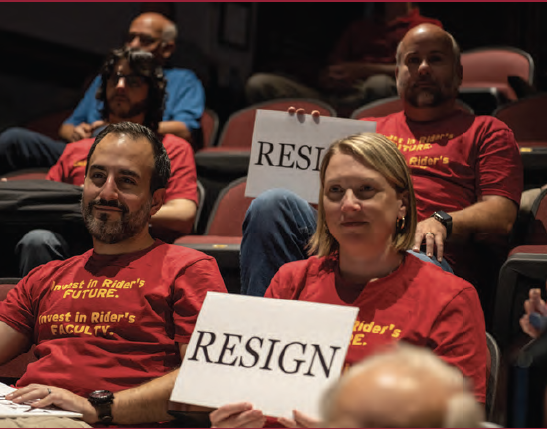
Faculty layoffs avoided; curriculum under evaluation
By Jake Tiger
RIDER’S administration announced Oct. 26 that there will be no faculty layoffs this fall, and it will instead take steps to strengthen its low-enrollment programs rather than trimming them, according to an email sent to faculty members by the university president and provost.
“We did a very detailed analysis, and at the end of that analysis, I did not see where we could lay off faculty,” said Rider Provost DonnaJean Fredeen in an interview with The Rider News. “I was looking at actual individual faculty assignments for the last three semesters and even doing that I didn’t see a place where we could be saying we have … too many faculty.”
There had been mentions of layoffs and program eliminations since July, but months of fear and tension from Rider’s professors culminated in a collective sigh of relief.
“[The professors are] very happy that they’re going to get to keep their jobs,” said Quinn Cunningham, president of Rider’s chapter of the American Association of University Professors. “Beyond that, we would still like new leadership. We still don’t necessarily think that this is the greatest leadership for Rider.”
According to Fredeen, the administration is urging departments to “tighten up” their curriculums in lieu of layoffs, cutting down on classes with low enrollment and little overlap across different majors.
“When I look at our academic portfolio right now, I think we have a very rich course offering,” said Fredeen. “I really think our focus at this point needs to be … where do we need to be investing in terms of current programs, as well as where we need to be investing in terms of new programs?”
Rider President Gregory Dell’Omo and Fredeen spent a majority of October meeting with each of the university’s departments to discuss their outlooks and how their course offerings can be reassessed, according to Fredeen.
“The faculty aren’t quite sure what the president-and-provost morale tour is,” said Cunningham. “I don’t think anyone really understands what that’s supposed to be or what’s supposed to come of it.”
Talks of reductions began July 27 during a summer webinar in which Dell’Omo detailed his plan for Rider’s future – particularly financially.
Dell’Omo said each program would be evaluated, claiming the university could no longer “offer every low-enrollment program simply on the basis of its individual academic value.”
Shortly after the webinar, the administration also contacted the AAUP requesting $1 million back over the next two years or else layoffs would be likely; the union declined to give the money back.
The two parties had recently negotiated a new collective bargaining agreement in September 2022 after multiple protests and a narrowly avoided strike.
The internal rift became more apparent on Aug. 31 when the AAUP held a silent protest at Dell’Omo’s university convocation. Union members quietly sat through the presentation while holding signs commanding the president to resign.
“There’s still a need for a change in leadership, in our opinion,” said Cunningham. “There’s some question marks about, like, why did you need a million dollars from us if now you can retain all of us?”


